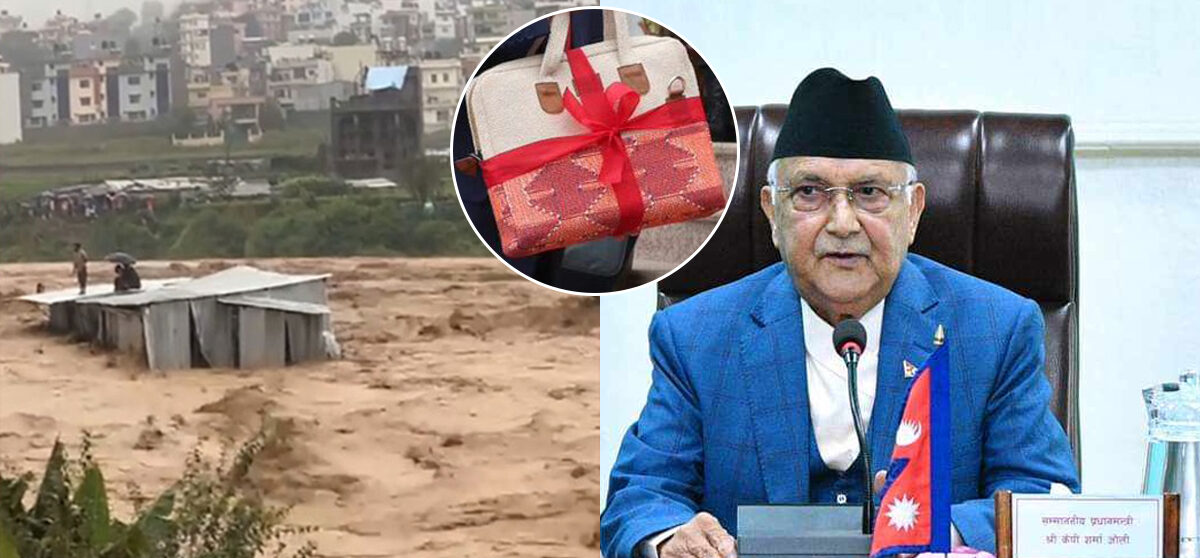KATHMANDU: Prime Minister KP Oli returned from the United States while many citizens were trapped in floods and landslides.
Defending his trip at Tribhuvan International Airport (TIA), he stated, “I did not go to America to milk buffaloes. Floods and landslides do not come with advance warning; we could not have prevented the floods. Don’t protest just for the sake of protest.”
As of October 22, the National Disaster Risk Reduction and Management Authority, chaired by PM Oli, reported that 250 people lost their lives in the September floods and landslides.
Additionally, 18 individuals are missing, 178 are injured, and 2.59 million citizens from 518,402 households have been affected, with financial losses exceeding Rs 46 billion.
PM Oli argued that the government could not have halted these natural disasters, which he described as “unnatural natural phenomena.”
However, this was a critical moment for the government to demonstrate its effectiveness in post-disaster rescue and relief operations, and it failed to do so.
Instead, PM Oli and his powerful government have faced backlash for their perceived helplessness following the disaster.
This time is no different. The government is spending more than its income, resulting in a public debt increase of nearly 90 billion rupees within three months of Oli’s tenure.
Despite their efforts to protect the government, the poor outcomes of the past 100 days, dubbed a “disaster and honeymoon,” have highlighted the ineffectiveness of PM Oli’s leadership.
During a presentation on the government’s 100-day achievements last Wednesday, PM Oli claimed, “Despite limited resources, an inherited deteriorating economic situation, and sudden natural calamities, the government is implementing policies, programs, and budgets in a speedy, effective, result-oriented, and citizen-friendly manner.”
From the outset of his speech, PM Oli detailed the calamities that have occurred since he took office as Prime Minister, having been sworn in last year alongside the Nepali Congress, the largest party in the House of Representatives.
However, even with a close to two-thirds majority, he faced criticism regarding his government’s achievements, which many view as attempts to obscure failures.
In response to widespread criticism of the powerful coalition government, which comprises two major parties in the House of Representatives, PM Oli has shifted his focus to the annual budget for the current fiscal year (2081/82), which was prepared by the previous government, including his own party.
Despite being part of the coalition, PM Oli has criticized the then-power partner, the Maoist Center, and Finance Minister Barshaman Pun for not presenting a budget that met his standards.
The former finance minister presented a budget estimate of Rs 1.86 trillion for the financial year 2081/82.
Following a change in coalition, the responsibility for implementing this budget fell on PM Oli, who is now supported by the Nepali Congress.
Despite the opposition led by the Maoist Center, which drafted the budget, PM Oli initially refrained from making specific negative statements about it, aside from amending Section 36 (6) of the Economic Bill, 2081.
However, after the recent disasters and the government’s inability to demonstrate concrete progress in the past 100 days, the Prime Minister has begun to voice dissatisfaction with the budget.
A source close to PM Oli revealed that he has started to implicate not only the Maoists, now in opposition, but also India regarding the budget.
The Prime Minister contends that other projects have been stalled due to excessive spending on Indian aid projects, reflecting his growing discontent with the current fiscal plan.
PM Oli’s chief political advisor, Bishnu Rimal, confirmed the Prime Minister’s dissatisfaction with the budget.
In an interview on a television talk show, Rimal stated that the policies and budget were established before the current government took office, limiting their ability to enact significant changes or transfers.
After the Jajarkot earthquake, reports indicated that reconstruction efforts were underway, even though our government was involved in such reporting.
He noted, “The policy program and budget made by one kind of government could not be changed by another government.”
Rimal emphasized the difficulties in implementing new programs, explaining that “the budget cannot be transferred for three months,” and the Ministry of Finance’s Line Ministry Budgetary Information System cannot be used without verification for money transfers.
Given these constraints, he concluded that it is not as straightforward as forming a government did in 2074 BS.
Rimal added, “Regarding the budget, we formed a new government because the economy has deteriorated, leaving us with limited resources to spend.
We were in the process of addressing these issues, which explains why progress has been slower than desired.
While swift action could have been taken during the disaster, some sensitive incidents affected public sentiment.
The government needed to handle these issues with greater sensitivity, but our responsiveness fell short.
Even minor incidents have caused discontent and irritation toward the government.”
After the Jajarkot earthquake, reports indicated that reconstruction efforts were underway, even though our government was involved in such reporting.
Regardless of our support for the Prime Minister, progress cannot continue if the necessary capabilities are lacking. We take moral responsibility for this.
Constantly Criticizing the Budget Yet Failing in Implementation
Initially aggressive toward the budget proposed by former Finance Minister Barshaman Pun from the previous coalition government, PM Oli has recently expressed dissatisfaction once again.
This is not the first instance of PM Oli exhibiting a lack of enthusiasm toward the budget.
In the budget introduced during the financial year 2078/079, after the UML-Maoist coalition formed, PM Oli included hundreds of projects without securing the necessary resources.
Following internal party conflicts with the former Maoists and the Madhav-Jhalanath faction, he recommended the dissolution of the House of Representatives just four days before a Federal Parliament meeting and asked then-Finance Minister Bishnu Prasad Paudel (currently serving as Finance Minister) to submit the budget through an ordinance.
The previous government canceled 1,400 road projects due to the inclusion of arbitrary projects in a budget that bypassed parliamentary approval.
In consultation with then-Prime Minister Sher Bahadur Deuba, Finance Minister Janardan Sharma reduced the budget for Oli’s arbitrary projects. Sharma became controversial after violating financial discipline.
At that time, Oli, who was in opposition, expressed anger over the budget for the last fiscal year 2079/080, alleging that it was designed to benefit certain business houses rather than the nation.
He criticized the practice of summoning businessmen to the Ministry of Finance and changing tax rates according to their preferences, arguing that this constituted economic indiscipline.
Former Finance Minister Sharma faced scrutiny in the “CCTV Scandal” related to outsourcing tax rate determinations to middlemen.
In subsequent years, Oli continued to voice dissatisfaction with the budgets, whether or not the UML participated in the government.
This pattern has persisted through the budget of the current financial year.
From Finance Minister Bishnu Prasad Paudel, who has served in both government and opposition roles, to UML MP Gokul Baskota, criticism of the current fiscal year’s budget has been rampant.
Minister Paudel, who is implementing the budget he previously criticized, remarked that former Finance Minister Pun did not provide any advice or suggestions during its formulation.
The PM Oli-led government has not delivered encouraging results regarding budget expenditure. According to the office of the Comptroller General, as of Monday, only 18.92 percent of targeted resources have been collected, while expenditure is limited to 19.46 percent.
Just days before, Oli addressed the parliamentary party meeting in the Lhotse Hall of the Parliament building, stating, “Without discussion with the parties, it has become increasingly unclear whether this is the finance minister’s budget or that of the party he represents.”
He noted that the distribution of funds appears to be somewhat skewed.
Despite the UML’s ongoing criticisms of the budget, they have failed to demonstrate concrete progress in its implementation.
The current government’s performance in both budget expenditure and resource management is weak.
When Oli becomes Prime Minister, the graph of public debt that Nepali citizens must bear rises rapidly.
This time is no different. The government is spending more than its income, resulting in a public debt increase of nearly 90 billion rupees within three months of Oli’s tenure.
By mid-October, public debt, which stood at Rs 2.43 trillion, had reached Rs 2.52 trillion.
The PM Oli-led government has not delivered encouraging results regarding budget expenditure. According to the office of the Comptroller General, as of Monday, only 18.92 percent of targeted resources have been collected, while expenditure is limited to 19.46 percent.
Notably, total capital expenditure is just 8.85 percent. Effective resource management and expenditure are critical to determining the government’s allocation efficiency.









Comment